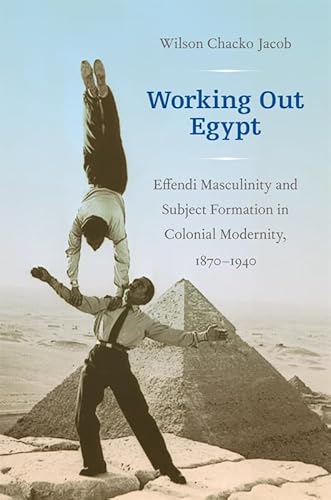Articles liés à Working Out Egypt: Effendi Masculinity and Subject...
Working Out Egypt: Effendi Masculinity and Subject Formation in Colonial Modernity, 1870 - 1940 - Couverture rigide

Synopsis
Working Out Egypt is both a rich cultural history of the formation of an Egyptian national subject in the late nineteenth century and early twentieth and a compelling critique of modern Middle Eastern historiography. Wilson Chacko Jacob describes how Egyptian men of a class akin to the cultural bourgeoisie (the effendiyya) struggled to escape from the long shadow cast by colonial depictions of the East as degenerate, feminine, and temporally behind an active and virile Europe. He argues that during British colonial rule (1882-1936), attempts to create a distinctively modern and Egyptian self free from the colonial gaze led to the formation of an ambivalent, performative subjectivity that he calls "effendi masculinity." Jacob traces effendi masculinity as it took hold during the interwar years, in realms from scouting and competitive sports to sex talk and fashion, considering its gendered performativity in relation to a late-nineteenth-century British discourse on masculinity and empire and an explicitly nationalist discourse on Egyptian masculinity. He contends that as an assemblage of colonial modernity, effendi masculinity was simultaneously local and global, national and international, and particular and universal. Until recently, modern Egyptian history has not allowed for such paradoxes; instead, Egyptian modernity has been narrated in the temporal and spatial terms of a separate Western modernity.
Les informations fournies dans la section « Synopsis » peuvent faire référence à une autre édition de ce titre.
À propos de l?auteur
Wilson Chacko Jacob is an Assistant Professor of History at Concordia University, Montreal.
Les informations fournies dans la section « A propos du livre » peuvent faire référence à une autre édition de ce titre.
EUR 5,16 expédition vers Etats-Unis
Destinations, frais et délaisAcheter neuf
Afficher cet articleEUR 13,74 expédition depuis Royaume-Uni vers Etats-Unis
Destinations, frais et délaisRésultats de recherche pour Working Out Egypt: Effendi Masculinity and Subject...
Working Out Egypt: Effendi Masculinity and Subject Formation in Colonial Modernity, 1870â"1940
Vendeur : Midtown Scholar Bookstore, Harrisburg, PA, Etats-Unis
Hardcover. Etat : Good. Good - Bumped and creased book with tears to the extremities, but not affecting the text block, may have remainder mark or previous owner's name - GOOD Standard-sized. N° de réf. du vendeur M0822346621Z3
Quantité disponible : 2 disponible(s)
Working Out Egypt: Effendi Masculinity and Subject Formation in Colonial Modernity, 1870-1940
Vendeur : Ria Christie Collections, Uxbridge, Royaume-Uni
Etat : New. In. N° de réf. du vendeur ria9780822346623_new
Quantité disponible : 1 disponible(s)
Working Out Egypt : Effendi Masculinity and Subject Formation in Colonial Modernity, 1870 - 1940
Vendeur : GreatBookPricesUK, Woodford Green, Royaume-Uni
Etat : New. N° de réf. du vendeur 12274653-n
Quantité disponible : 1 disponible(s)
Working Out Egypt: Effendi Masculinity and Subject Formation in Colonial Modernity, 1870-1940
Vendeur : THE SAINT BOOKSTORE, Southport, Royaume-Uni
Hardback. Etat : New. New copy - Usually dispatched within 4 working days. 870. N° de réf. du vendeur B9780822346623
Quantité disponible : 1 disponible(s)
Working Out Egypt: Effendi Masculinity and Subject Formation in Colonial Modernity, 1870-1940
Vendeur : moluna, Greven, Allemagne
Gebunden. Etat : New. Describes how attempts to create a modern Egyptian self free from the colonial gaze were enacted through discourses of gender and sexuality during the British colonial period.Über den AutorWilson Chacko Jacob is an Assistant Pro. N° de réf. du vendeur 867678079
Quantité disponible : 1 disponible(s)
Working Out Egypt : Effendi Masculinity and Subject Formation in Colonial Modernity, 1870 - 1940
Vendeur : GreatBookPricesUK, Woodford Green, Royaume-Uni
Etat : As New. Unread book in perfect condition. N° de réf. du vendeur 12274653
Quantité disponible : 1 disponible(s)
Working Out Egypt : Effendi Masculinity and Subject Formation in Colonial Modernity, 1870-1940
Vendeur : AHA-BUCH GmbH, Einbeck, Allemagne
Buch. Etat : Neu. Neuware - Working Out Egypt is both a rich cultural history of the formation of an Egyptian national subject in the late nineteenth century and early twentieth and a compelling critique of modern Middle Eastern historiography. Wilson Chacko Jacob describes how Egyptian men of a class akin to the cultural bourgeoisie (the effendiyya) struggled to escape from the long shadow cast by colonial depictions of the East as degenerate, feminine, and temporally behind an active and virile Europe. He argues that during British colonial rule (18821936), attempts to create a distinctively modern and Egyptian self free from the colonial gaze led to the formation of an ambivalent, performative subjectivity that he calls "effendi masculinity." Jacob traces effendi masculinity as it took hold during the interwar years, in realms from scouting and competitive sports to sex talk and fashion, considering its gendered performativity in relation to a late-nineteenth-century British discourse on masculinity and empire and an explicitly nationalist discourse on Egyptian masculinity. He contends that as an assemblage of colonial modernity, effendi masculinity was simultaneously local and global, national and international, and particular and universal. Until recently, modern Egyptian history has not allowed for such paradoxes; instead, Egyptian modernity has been narrated in the temporal and spatial terms of a separate Western modernity. N° de réf. du vendeur 9780822346623
Quantité disponible : 1 disponible(s)

